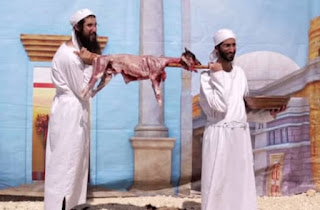THE LIVES OF THE PATRIARCHS #96 | THE LIFE OF MOSES #78
Pastor Christopher Choo
Lesson 3780
THE LIVES OF THE PATRIARCHS #96
THE LIFE OF MOSES #78
Lessons from Passover #4
Do Christians have to observe the Jewish Passover Meal ( Seder )?
Passover was relevant to all first-century believers: It was a constant reminder that we are no longer slaves in the bondage of sin, but are now spiritually free to follow and honor the Lord because Messiah, our Passover, also has been sacrificed.
We are to no longer live as slaves to sin but live as new creations through Messiah’s gracious atonement.
Passover clearly demonstrates that we are free from bondage and not that we might foolishly do as we please, but, that we might follow God into the ‘Land of Promise,’ and be pleasing to Him.
Passover is a present picture of living a fulfilled life, not merely a record of some ancient biblical event.
Passover was observed and celebrated by New Covenant believers as early members were mainly Jewish.
But the Corinthian church also had former pagans in their midst.
So the question remains: must believers observe the Jewish Passover Seder?
Paul was not telling the Corinthians that they should start keeping the Passover, they already were in some ways. The point is that they needed to do it properly.
Paul’s point is that Passover should be celebrated with a pure heart, otherwise it is a demonstration of hypocrisy.
Paul understood that, for believers, Passover was to always be celebrated as Moses taught. In 1 Corinthians 5:8, Paul uses the very same Greek word that is used for ‘celebrate’ in the Greek version of Exodus 12:14: “Now this day will be a memorial to you, and you shall celebrate it as a feast to the LORD; throughout your generations, you are to celebrate it as a permanent ordinance.”
When Paul wrote to the Corinthians (and us), “Therefore let us celebrate the feast” he may have been thinking of this very verse that Moses shared with Israel.
We can see clearly the Messianic fulfillment of the Passover in Yeshua, and we should celebrate it with the eternal perspective of Messiah, and to His glory.
But it serves as a normative example and is not the rule.
Insight on the spiritual truths of the Scriptures is a healthy reminder to live pleasing to the Lord. Those New Covenant believers and congregations that do choose to celebrate Passover and study their “Jewish roots” discover great truths and blessings. They more clearly recognize God’s faithfulness, and “they do not support the root, but the root supports them” (Romans 11:18).
Conclusion
Faith finds sustenance in the lamb (12:8-10). The slain lamb became food. Eating was a symbol of peace and fellowship, but it was also an act of nourishment.
By eating they assimilated the lamb to themselves. What the Passover lamb was to the body, so feasting on Christ is to the soul (John 6:48–56).
By feasting on Christ, we receive nourishment and strength for living.
Feasting on Christ should not be a one-time meal; the more the better.
Faith begins a new life. The Passover was the “beginning of months ... the first month of the year” (12:2).
The Passover marked the birthday of the nation, the beginning of a journey that put Egypt behind them and the Promised Land ahead.
So faith in Christ is not the end; it is the beginning of a new life. Faith takes the believer on a journey. Faith in Christ marks a new life with the world and sin behind and eternal glory ahead.
Old things are passed away and all things have become new.
So let us remember that “Christ our Passover is sacrificed for us” and “let us keep the feast” (not in fact but in faith in what it teaches) in “sincerity and truth” (1 Cor. 5:7-8).
As Christians, we are no longer bound by Old Testament Law (Romans 10:4). However, the New Testament doesn’t forbid the celebration of Old Testament festivals.
In the end, we must look to verses like Colossians 2:16-17:
"Therefore do not let anyone judge you by what you eat or drink, or with regard to a religious festival, a New Moon celebration, or a Sabbath day."
These are a shadow of the things that were to come; the reality, however, is found in Christ.
What matters is our worship of Christ.
In some ways, this will look different for each person.
Whether we celebrate the Passover or not, it is helpful to learn from it and remember Christ’s sacrifice as our Passover Lamb.





